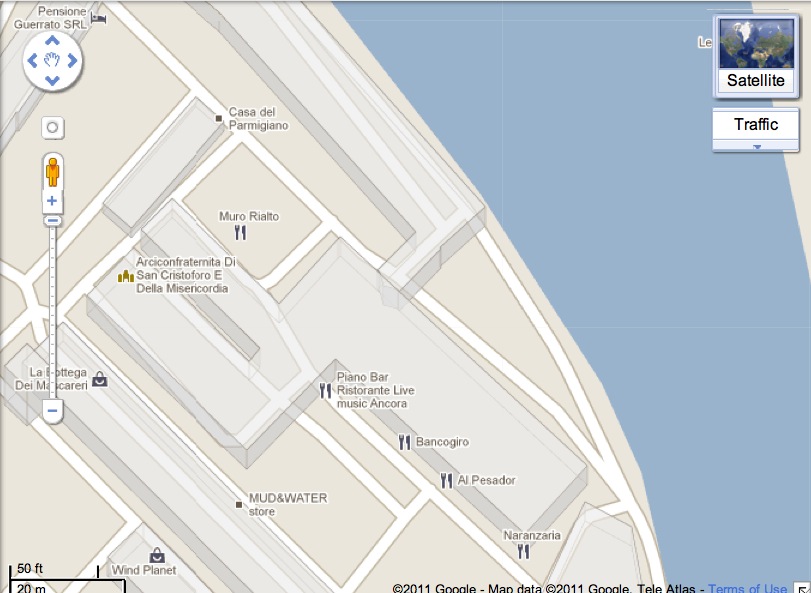Last week we spent a lot of time here, in Venice:
The triangular marble plaza on the edge of the Grand Canal of Venice is known informally as Bancogiro, once one of Italy’s landmark banks, and now the name of an osteria there. The plaza is part of Rialto Mercado, the marketplace where Marco Polo was based and prospered when he wasn’t out opening trade routes to the east. It’s also where Shakespeare set The Merchant of Venice, and where Luca Pacioli studied double entry bookkeeping, which he described in Summa de arithmetica, geometria, proportioni et proportionalità (Venice 1494), one of the first textbooks written in the vernacular (rather than Latin), and an early success story of the printing press.
Here’s a photo set of the place.
Here’s a 360° view. (While it’s called “Fondamenta de la Preson,” that’s just the cockeyed white building in the map above — a former womens prison — in the corner of the plaza.)
Note that Google Maps tells us little about the location, but plenty about the commercial establishments there. When I go for a less fancy view, the problem gets worse:
In that pull-down menu (where it says “Traffic”) I can turn on webcams, photos and other stuff from the Long Tail; but there’s no way to turn on labels for the Grand Canal, the Bancogiro plaza, the Rialto Mercado vaporetto (water bus) stop, the Rialto Mercado itself, the Fondamenta de la Preson (women’s prison, labeled, sort of, in the upper view but not the lower), or even the @#$% street names. The only non-commercial item on the map is the Arciconfraternita Di San Cristoforo E Della Misericordia, which is an organization more than a place.
(My wife just said “You know those hotel maps they give away, that only show hotels? It’s like that, only worse. The hotel maps at least give you some street names.”)
For example, try to find information about the Bancogiro: that is, about the original historic bank, rather than the osteria or the other commercial places with that name. (Here’s one lookup.) For awhile I thought the best information I could find on the Web was text from the restaurant menu, which I posted here. That says the bank was founded in 1157. But this scholarly document says 1617. Another seems to agree. But both are buried under commercial links.
The problem here is that the Web has become commercialized at the cost of other needs of use. And Google itself is leading the way — to the point where it is beginning to fail in its mission to “organize the world‘s information and make it universally accessible and useful.”
This is understandable, and easily rationalized. Google is a commercial enterprise. It makes money by selling advertising, and placing commercial information in settings like the ones above. This has been good in many ways, and funds many free services. But it has subordinated purely useful purposes, such as finding the name of a street, a canal, or a bus stop.
There are (at least) two central problems here for Google and other giants like it. One is that we’re not always buying something, or looking only for commercial information. The other is that advertising should not be the only business model for the likes of Google, and all who depend on it are at risk while it remains so.
One missing piece is a direct market for useful information. Toward that end I’ll put this out there: I am willing to pay for at least some of the information I want. I don’t expect all information to be free. I don’t think the fact that information is easily copied and re-used means information “wants” to be free. In other words, I think there is a market here. And I don’t think the lack of one is proof that one can’t be built.
What we need first isn’t better offerings from Google, but better signaling from the demand side of the marketplace. That’s what I’m try to do right now, by signaling my willingness to pay something for information that nobody is currently selling at any price. We need to work on systems that make both signaling and paying possible — on the buyer’s terms, and not just the seller’s.
This is a big part of what VRM, or Vendor Relationship Management is about. Development is going on here. EmanciPay, for example, should be of interest to anybody who would like to see less money left on the market’s table.


Leave a Reply